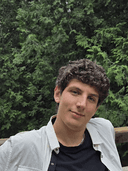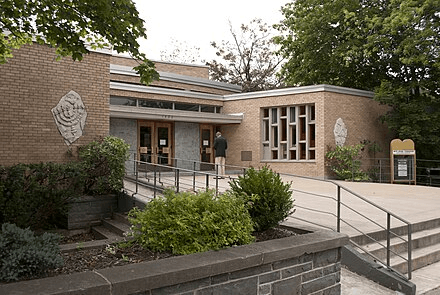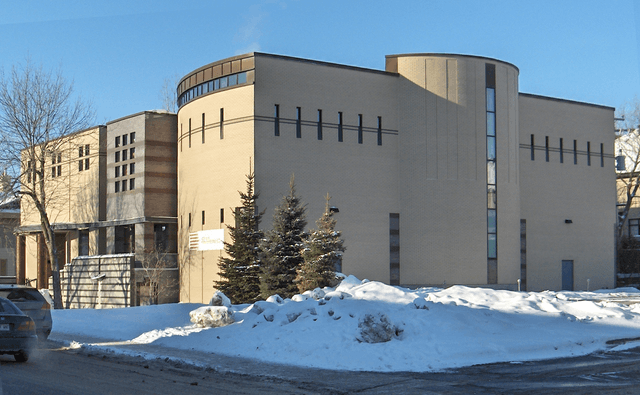In five months of operation, Nu Magazine has posed the question of what is Jewish culture to McGill professors, musicians, and New York Times journalists. Darren Rosenblum (they/them) is a full professor in the Faculty of Law and served as Associate Dean (Graduate Studies) from 2022 to 2024. Over bowls of elaborately named salads from Mandy’s on Crescent Street, Rosenblum discussed Jewish culture and how deeply it connects with their gay identity.
Rosenblum's research focuses on corporate governance, particularly diversity initiatives and sex inequality remedies. After spending time in the private sector, they took a position at Pace University School of Law in New York. They wrote the first article of Queer Legal Theory, “Queer Intersectionality”, and the first article on transgender prisoners, “Trapped in Sing Sing” (2000). Rosenblum always wanted to work in a French-speaking city, so the eventual move to McGill in 2021 made sense.
As a child, Rosenblum was mostly a “High Holiday Jew.” They appreciated the emphasis on family in Judaism, but the religious aspects felt cultish. Growing up in a largely Jewish suburb served to erase the difference in Judaism. “It allows you to take it for granted that this is who you are because everybody is the same exact way,” Rosenblum said. “Today in 2025, I think of this in regards to being LGBT. In the world at least where my daughter circulates [and at McGill], it seems almost irrelevant and feels like everyone is bi or gay, and no one really cares. As an identity it just means less; whereas, when I was growing up, being gay meant a lot to me and to everyone else.”
Antisemitic experiences during their undergraduate exchange in Paris, alongside the Parisian obsession with Woody Allen and Barbra Streisand, helped Rosenblum understand the uniqueness of their Jewish identity. Upon returning to the University of Pennsylvania for senior year, Rosenblum, for the first time, made the active choice to attend synagogue. At first, the gay Synagogue in Philadelphia and then Congregation Beit Simchat Torah (CBST), the LGBT synagogue in New York City.
“I developed a home in Judaism through my gay identity,” Rosenblum explained. “I’ve always been so gay that I’ve never really felt entirely comfortable in straight spaces, particularly back then [...] I would never have gone to Hillel. I wasn’t that observant, and would have stood out. Had it not been for an LGBT synagogue, I would not have been Jewish.”
Over time, Judaism has become more central to Rosenblum. They have understood Jewish culture to be both “high and low.” It could be literature, food, Mel Brooks, or paintings by Mark Rothko. Throughout our conversation, they referred to plays as a source for their Jewish culture. “I'm really connected when I see plays that have something to do with Judaism or Jewish identity.” Angels in America by Tony Kushner, which centres on gay Jewish characters in New York City during the AIDS crisis, was a particularly “visceral experience.”
Gay identity and Jewish culture, specifically the concept of L’dor V’dor, are often inseparable for Rosenblum. The baby-naming ceremony of a lesbian lawyer’s child at a synagogue inspired Rosenblum to want to have a child because it made them “aware of [their] place in the sequence of generations and the need to pass things on.” With their husband Howard, they raised their daughter at CBST. Their daughter’s Bat Mitzvah at CBST proved meaningful: “Whether or not she continues to be someone who identifies as Jewish, I was able to give her a piece of my grandparents.”
As we finished up our conversation over cups of black tea, Rosenblum’s connection between gay identity and Jewish culture reached a crescendo.
“The fact that I am alive even is partly because I’m Jewish ,” said Rosenblum. “I came out in 1984 when AIDS was everywhere [....] Because of the L'dor V’dor thing, Jewish families are simply less likely to throw their kid out of the house. Jewish parents don’t do that—they live for their children. I live for my child. My parents accepted me and loved me, which gave room for me to take my own life seriously.”
Powered by Froala Editor


-8chdIh6ZJ7im7g5x1Wwb2jrgO4hM9j.png&w=1920&q=75)



